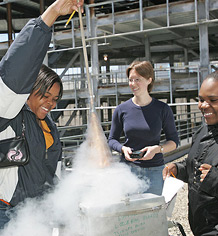Public engagement a major component of UChicago’s federal stimulus research projects
University of Chicago researchers have reaped a bonanza of $71.5 million in federal stimulus money as of Sept. 30, according to the office of the Vice President for Research and for National Laboratories.
The blockage of arteries in PAH is caused by proliferating cells that grow too fast and don't die off, as they normally would. Therefore, University of Chicago scientists studying PAH are not only finding cures for PAH and other forms of pulmonary hypertension, they are also gaining insights into the mechanism of cancer, which is also caused by uncontrolled cell growth.
Three agencies are providing the funds in 150 grants to the University under the American Recovery and Reinvestment Act, creating or preserving 35 jobs in the first year of funding. The University submitted 512 proposals requesting $371 million.
Most of the funding—$60.6 million in 121 grants—came from the National Institutes of Health. For an overview, see: Science Stimulus Boosts University Research.
The NEA allocated one grant, for $25,000, which will partially support the salaries of two employees of the University of Chicago Presents concert series. UCP produces 25 to 35 events each season.
The NSF, meanwhile, provided 28 grants for $10.9 million. The Office of Graduate Affairs received the largest, for $2 million, to support the Graduate Research Fellowship Program. The fellowships provide three years of support for graduate study leading to research-based master's or doctoral degrees and are intended for students in the early stages of their graduate study.
Two NSF grants totaling more than $1 million will support elementary particle physicists at the University, including participation in the world’s largest scientific experiment, the Large Hadron Collider in Switzerland. One of the grant recipients, Florencia Canelli, Assistant Professor in Physics, is a member of the LHC’s ATLAS (A Toroidal Large Hadron Collider Apparatus) collaboration.
Canelli works within the ALTAS trigger and data acquisition group to design and construct a Fast Tracker Trigger, which will rapidly identify the subatomic particles of greatest interest from the massive data-driven experiment.
Canelli will devote part of her grant to public outreach, including a science lecture series for seventh-grade students from the Chicago Public Schools, and “Girls Science Salon,” to encourage girls in sixth through eighth grade to pursue science in their education and careers.
Receiving the other grant for particle physics research are theoreticians Jeffery Harvey, the Enrico Fermi Distinguished Service Professor in Physics, and Richard Hill, Assistant Professor in Physics. Harvey and Hill will develop new theoretical tools to analyze possible new fundamental particles and interactions, and will work with experimenters at Fermi National Accelerator Laboratory and at the LHC to help discover them.
Hill also will serve as a mentor and consultant in the UChicago Laboratory Schools "May Project" independent study program. The program exposes high-school seniors to university-level research and gives them the opportunity to investigate questions at the frontiers of physics.
Physicists Heinrich Jaeger and Sidney Nagel also received more than $1 million in ARRA funding from the NSF. Jaeger, Professor in Physics, has two grants, which will contribute more than $711,000 toward the study of granular powder flows and nanoparticle self-assembly.
"In addition to the industrial and economic value associated with the proper control of particulate matter, the study of granular materials provides insights into fundamental, cross-cutting scientific issues over a wide range of science and engineering disciplines," Jaeger said. His team will work with the Chicago Museum of Science and Industry to develop activities that will engage the public.
Self-organizing nanoparticles offer special opportunities for the design of next-generation materials, according to Jaeger. That grant will extend his work on the fabrication of a new class of ultra-thin sheets. Fabricated from metal nanoparticles, they combine extreme flexibility with unusual mechanical strength.
Nagel's $350,000 grant will establish a partnership between UChicago's Materials Research Science and Engineering Center and the City College of New York. The goals are to provide research and education opportunities in the dynamics of splashing droplets, granular particles and other materials, and to increase participation of under-represented groups in materials research.
Scientists in the Geophysical Sciences received four NSF grants for $1.7 million. Most of the total will support two Arctic research projects.
John Frederick, Professor in Geophysical Sciences, will continue his ultraviolet radiation measurements in Barrow, Alaska, and Summit, Greenland, as part of the international Study of Environmental Arctic Change. In collaboration with UChicago's Graham School of General Studies, he will provide summer courses for teachers from Chicago Public Schools that primarily enroll minority students.
Douglas MacAyeal, Professor in Geophysical Sciences, will study the processes and consequences of surface melt-water production on the Greenland ice sheet.
Researchers in Mathematics are receiving five grants for $751,000. Among the projects: Assistant Professor Monica Visan's research on partial differential equations.
"The equations under investigation in this project have a rich history," Visan said. "They have been studied by mathematicians and physicists alike because they capture important facets of certain physical behaviors, while maintaining an attractive simplicity."
A $600,000 NSF grant will fuel Andrey Rzhetsky's efforts to develop a computational method for accelerating scientific discovery by harvesting, synthesizing, comparing and communicating the diverse, competing, and often-unpublished hypotheses that could accelerate scientific discovery.
"Every field of modern biomedicine hosts a rich plurality of theoretical views, but most remain unknown to the majority," said Rzhetsky, Ph.D., Professor of Medicine and Human Genetics. "This often unwarranted narrowness of focus is particularly disturbing in fields devoted to the biology and cure of complex maladies such as autism, schizophrenia, diabetes, and breast cancer."
by Steve Koppes











